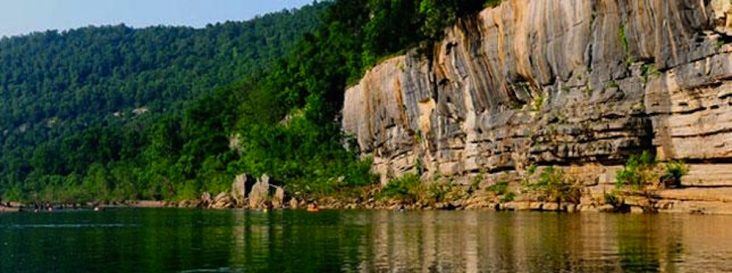Gov. Hutchinson tells tourism group goals met with Buffalo River
by February 11, 2020 4:07 pm 1,373 views

Gov. Asa Hutchinson said Tuesday (Feb. 11) he created three goals at the beginning of 2019 regarding the C&H Farms hog operation along the Buffalo River watershed, and all three were accomplished.
Speaking to the Southeast Tourism Society’s Connection Conference in Little Rock, Hutchinson said he wanted to buy out the owners of the farm in a fair transaction. Second, he wanted to make permanent the moratorium against concentrated animal feeding operations in the watershed. And third, he wanted to create a grant program with public and private dollars for farmers and municipalities to have better water management practices within the watershed. All three have been achieved.
“It was a good year for the Buffalo River,” Hutchinson said. “It was a good year for the next generation of those that will enjoy our outdoors here in this state from all over the United States, that will come and see nature, that will see the God of creation, that will see and enjoy something that has been there throughout time.”
The governor after his speech was presented a framed photo of a river otter from the Buffalo River Watershed Alliance, National Parks Conservation Association, Ozark Society and the Arkansas Canoe Club. He received a prolonged standing ovation as he left the meeting.
The Southeast Tourism Society seeks to support the travel and tourism industry in the southeastern United States.
Hutchinson announced June 13 that the state had entered into a voluntary agreement to pay Richard and Phillip Campbell and Jason Henson $6.2 million to close their concentrated animal feeding operation located 6.6 miles from Big Creek, which flows into the Buffalo National River. Of that, at least $5.2 million will come from the taxpayers, with the rest coming from private donations through The Nature Conservancy.
The agreement prohibits using any building on the property for “the feeding, breeding, raising or holding of animals” that is “specifically designed as a confinement area where manure may accumulate.”
The three received a permit in 2012 allowing them to raise approximately 6,500 hogs. The Arkansas Department of Environmental Quality twice rejected the farm’s application for a new operating permit, citing water quality issues and inadequate testing. But the owners appealed in circuit court and filed a civil lawsuit.
Opponents feared the farm’s waste was polluting the nation’s first national river and campaigned to close it.
Hutchinson complimented advocates who attended town hall meetings and politely asked him to protect the river. He mentioned by name former U.S. Rep. Ed Bethune, who was in attendance and who wrote many letters in support of the river. Hutchinson said he is a “lover of the Buffalo River myself” and has floated it and watched its recent history unfold. He called it “a great national asset.”
Hutchinson told attendees that tourism is the state’s second leading economic driver. Outdoor recreation in Arkansas generates $9.7 billion in consumer spending, supports 96,000 jobs and creates $2.5 billion in wages and salaries.
He referenced a recent $20 million matching grant from the Walton Family Foundation that, when paired with federal grants, will complete the 84.5-mile Delta Heritage biking and pedestrian trail from Lexa to Arkansas City. He said he has created an advisory council that is working to pass bicycle-friendly legislation. Also, Act 650, passed in the 2019 legislative session, allows bicyclists to regard stop signs as yield signs, and red lights as stop signs.
